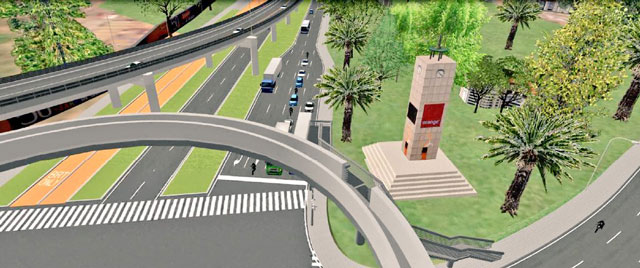
Kampala, Uganda | THE INDEPENDENT | Uganda risks losing sh300 million every day if there are any delays in the Kampala Flyover Project that started last month.
The sh224 billion project, undertaken by Japan International Cooperation Agency (JICA) involves the construction of flyovers at the Clock Tower, and at Kitgum House as one of the initiatives to decongest the city.
The project will also cover widening of Nsambya and Mukwano Road and improvements of interfacing roads and junctions.
But the Executive Director of Uganda National Roads Authority (UNRA) Allen Kagina says that any delays in the project will be met with a fine of $81,000 (298.2 million Shillings), in line with the terms of the contract.
“When you translate that, it comes to 300 million Shilling per day if the equipment is standing idle. It is in the agreement, it is anticipated that when the contractor is given commencement, he must have access to land. Any delay means he will not work, when he doesn’t work, the contract requires that he charges,” Kagina explained.
Kagina was appearing before Parliament’s Committee on Commissions, Statutory Authorities and State Enterprises (COSASE), where she was asked to explain a mischarge of 150 billion Shillings in UNRA expenditures. She blamed it on liabilities paid to contractors owing to penalties from idle equipment resulting from delayed projects.
She said that a number of projects are usually delayed by failure to acquire land for works to commence, adding that UNRA had to reallocate money to pay arrears and liabilities. She noted that there are high chances for the country to lose money since some of the land required for this project has not been acquired, further delaying the project.
Kira Municipality’s Ibrahim Ssemujju Nganda questioned why the government enters into such contracts which expose it to exorbitant liability costs. Ssemujju wondered how a government entity signs an agreement before sorting out land issues.
In her response, Kagina stated that the anticipation is that the issues shall be resolved in time. She added that where conflicts take long, they request to deposit money with the court and the parties involved allow them to proceed.
The committee said that it would hold a separate meeting with UNRA to discuss this issue.
*****
URN
 The Independent Uganda: You get the Truth we Pay the Price
The Independent Uganda: You get the Truth we Pay the Price




Attention to details not paid for the construction of the national infrastructure.